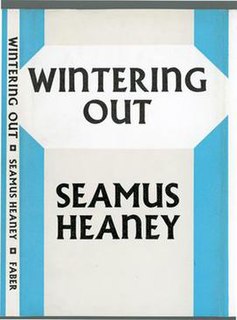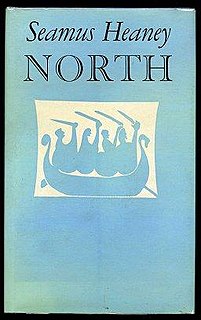The Belfast Group was a poets' workshop which was organized by Philip Hobsbaum when he moved to Belfast in October 1963 to lecture in English at Queen's University.
As with Hobsbaum's earlier discussion group in London, known as The Group, the meetings commenced with the discussion of a single poet's work. After a break for coffee and biscuits, there was an open session in which participants could read any work they wished to. The group met once a week, initially on Tuesday evenings at 8:00pm, later on Monday evenings. During term time it met at No. 4 Fitzwilliam Street, Philip and Hannah Hobsbaum's home near the university.
Seamus Heaney attended group meetings from the start. Seven of the poems in Heaney's Eleven Poems (November 1965) were taken from his 'group sheets'. Heaney has said that the group "ratified the idea of writing". Michael Longley started attending after his return to Belfast in 1964. He has said that the group gave "an air of seriousness and electricity to the notion of writing", and that he was "surprised by the ferocity of Hobsbaum's attack". Other participants over the years included: James Simmons, Paul Muldoon, Ciarán Carson, Stewart Parker, Bernard MacLaverty, Frank Ormsby and the critics Edna Longley and Michael Allen. Louis Muinzer, the translator and theatre director was also a member of the group.
In 1965 and 1966, the Belfast Festival at Queen's published pamphlets by some of the members of the group, including Heaney, Longley, and this attracted a certain amount of publicity. After Hobsbaum's departure for Glasgow in 1966, the Group lapsed for a while, but then was reconstituted in 1968 by Michael Allen, Arthur Terry, and Heaney. Meetings were held at Seamus and Marie Heaney's house on Ashley Avenue. May 1968 saw the first issue of The Honest Ulsterman, edited by James Simmons.
The Belfast Group ceased to exist in 1972.

Seamus Justin Heaney was an Irish poet, playwright and translator. He received the 1995 Nobel Prize in Literature. Among his best-known works is Death of a Naturalist (1966), his first major published volume. Heaney was and is still recognised as one of the principal contributors to poetry in Ireland during his lifetime. American poet Robert Lowell described him as "the most important Irish poet since Yeats", and many others, including the academic John Sutherland, have said that he was "the greatest poet of our age". Robert Pinsky has stated that "with his wonderful gift of eye and ear Heaney has the gift of the story-teller." Upon his death in 2013, The Independent described him as "probably the best-known poet in the world".

Paul Muldoon is an Irish poet. He has published more than thirty collections and won a Pulitzer Prize for Poetry and the T. S. Eliot Prize. At Princeton University he is currently both the Howard G. B. Clark '21 University Professor in the Humanities and Founding Chair of the Lewis Center for the Arts. He held the post of Oxford Professor of Poetry from 1999 to 2004 and has also served as president of the Poetry Society (UK) and Poetry Editor at The New Yorker.
The Penguin Book of Contemporary British Poetry is a poetry anthology edited by Blake Morrison and Andrew Motion, and published in 1982 by Penguin Books.
Francis Arthur Ormsby is a Northern Irish author and poet.
Alan Charles Brownjohn is an English poet and novelist. He has also worked as a teacher, lecturer, critic and broadcaster.
Philip Dennis Hobsbaum was a British teacher, poet and critic.
The Group was an informal group of poets who met in London from the mid-1950s to the mid-1960s. As a poetic movement in Great Britain it is often seen as being the successor to The Movement.

Michael Longley,, is an Anglo-Irish poet.

Death of a Naturalist (1966) is a collection of poems written by Seamus Heaney, who received the 1995 Nobel Prize in Literature. The collection was Heaney's first major published volume, and includes ideas that he had presented at meetings of The Belfast Group. Death of a Naturalist won the Cholmondeley Award, the Gregory Award, the Somerset Maugham Award, and the Geoffrey Faber Memorial Prize.
James Stewart Alexander Simmons (1933–2001) was a poet, literary critic and songwriter from Derry, Northern Ireland.
The Honest Ulsterman is a long-running Northern Ireland literary magazine that was established by James Simmons in 1968. It was then edited for twenty years by Frank Ormsby. It has returned as an online publication from 2014 onwards.
Nationality words link to articles with information on the nation's poetry or literature.
Nationality words link to articles with information on the nation's poetry or literature.

Wintering Out (1972) is a poetry collection by Seamus Heaney, who received the 1995 Nobel Prize in Literature.

North (1975) is a collection of poems written by Seamus Heaney, who received the 1995 Nobel Prize in Literature. It was the first of his works that directly dealt with the Troubles in Northern Ireland, and it looks frequently to the past for images and symbols relevant to the violence and political unrest of that time. Heaney has been recorded reading this collection on the Seamus Heaney Collected Poems album.
Raymond Henry Charles Warren is a British composer and university teacher.
Edna Longley is an Irish literary critic and cultural commentator specialising in modern Irish and British poetry.

That part of the United Kingdom called Northern Ireland was created in 1922, with the partition of the island of Ireland. The majority of the population of Northern Ireland wanted to remain within the United Kingdom. Most of these were the Protestant descendants of colonists from Great Britain.
John Wilson Foster is an Irish literary critic and cultural historian.

"Punishment" is a poem by Irish poet Seamus Heaney first published in his 1975 collection North. It, along with "Bog Queen", "The Grauballe Man", "Strange Fruit" and "The Tollund Man", is inspired by P.V. Glob's book, The Bog People."Punishment" highlights similarities between Europe's ancient past and The Troubles in Northern Ireland.